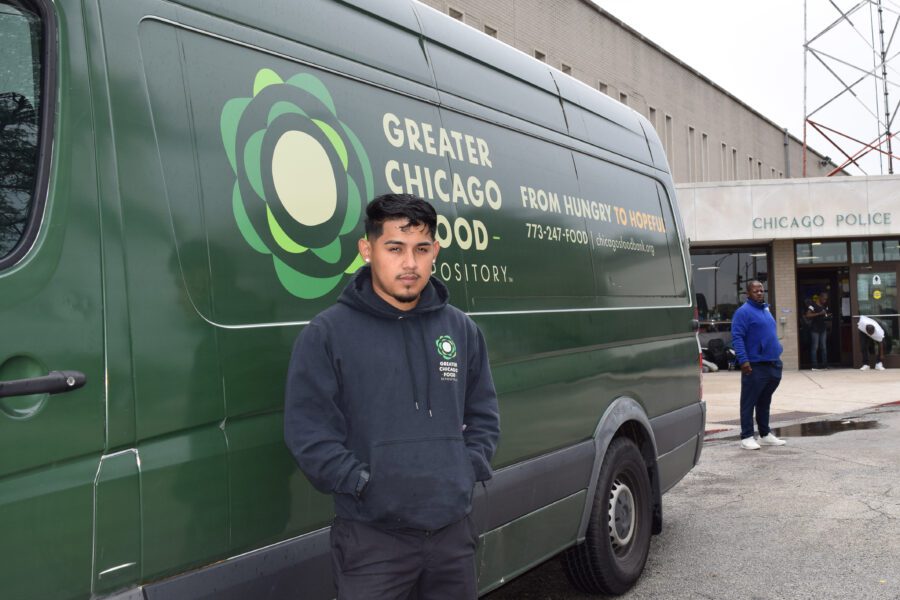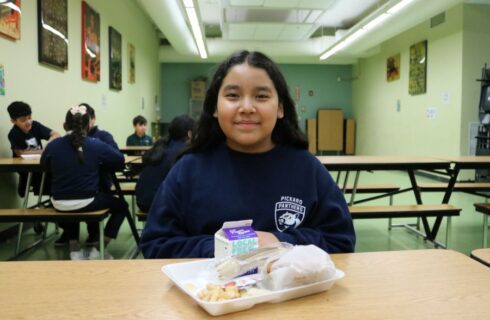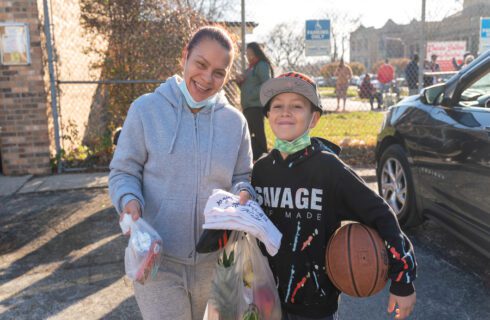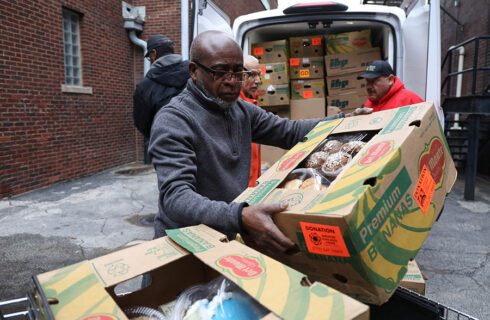Three days a week, Angel Zamora’s arrival is highly anticipated. As soon as the Food Depository driver pulls up in front of a southside Chicago police station, a couple of men emerge from the bustling lobby, eager to help unload the bottled water and fresh produce in his van.
Zamora greets the men in Spanish and together all three unpack boxes as a line of men and women, several carrying sleeping children, starts to form near the back of the van to receive individual bags of food.
The scene repeats throughout the day at ten other police stations across Chicago, where families and individuals who have recently arrived from the southern U.S. border are temporarily staying. Another Food Depository driver makes a similar route to 10 more police stations three days a week.
At each of his delivery sites, Zamora is greeted with pure gratitude.
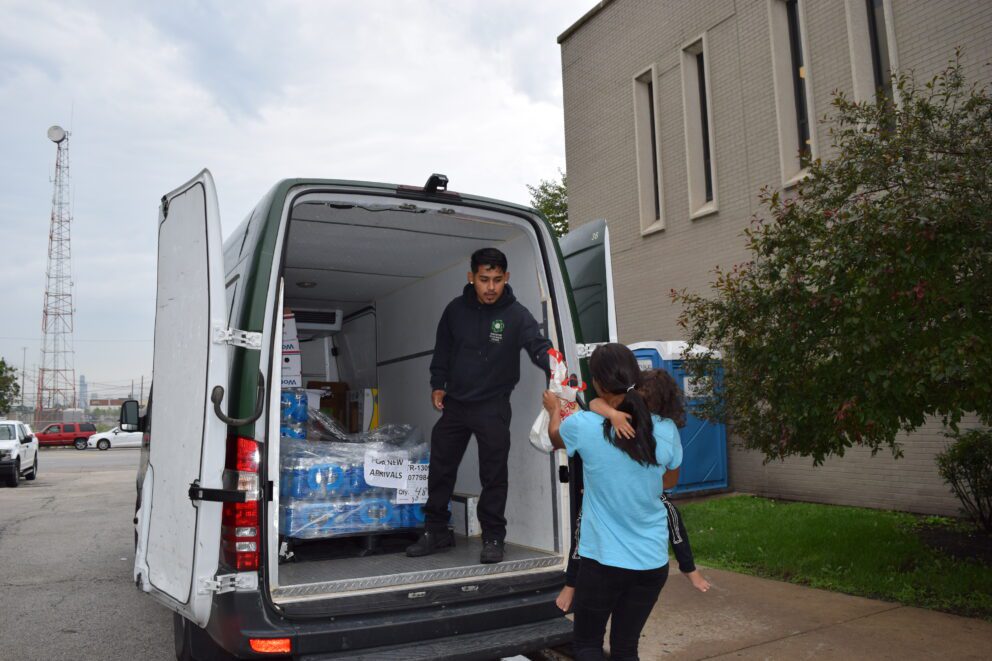
Angel Zamora delivers food at a Chicago police station.
“There’s always a positive energy,” he said. In addition to the men who help unload the van, ensuring the women and children are served first, Zamora is struck by other expressions of selflessness. “If I’m delivering water, most will take two bottles and tell me to take the rest to another site.”
“Honestly, it’s really humbling,” Zamora said. “It’s heartwarming to give them a hand.”
A basic human right
Since September 2022, the Food Depository has worked with the City of Chicago and State of Illinois, a coalition of nonprofit organizations, and our partner network to help meet the basic need for food and other vital resources of asylum-seeking individuals and families arriving in Chicago. In addition to deliveries at police stations, we are providing meals, snacks, water and diapers at shelter sites throughout the city.
“Our response is guided by the belief that food is a basic human right and everyone deserves to eat, whether they arrived in our community today or have lived here their entire life,” said Amy Laboy, the Food Depository’s Vice President of programs and community partnerships.
While distributing bags of oranges, crackers, tuna and toiletries, Zamora has learned that many of the new arrivals were compelled to take the often-dangerous journey to the U.S. to escape violence, poverty, and hunger.
“They tell me that whenever they got paid, all the money went for groceries – and all they could afford was bread,” Zamora said.
Many have shared stories of long journeys on foot, where some encountered violence or were robbed of the few possessions they had. “Most of them have nothing, no one,” Zamora said. Several of the men have asked him if they know of any work they can do, eager to start supporting their families themselves.
Like Zamora, Abraham Jiminez, manager of partner relations for the Food Depository, was struck by the new arrivals’ overwhelming gratitude when he helped with some of our early deliveries to police stations. “Gratitude not just for the food, but also that we were there, we were present."
"Obviously, we can’t provide everything they need," Jiminez said, "but they were grateful that with our presence we were saying, ‘You do matter. People do care for you here.’”
Meals and more
As we supply nutritious meals to people staying at shelter sites, we are also addressing the root causes of poverty and hunger locally. We source many of the high-quality and culturally affirming meals from BIPOC (Black, Indigenous, People of Color) and certified MWBE (Minority-and Women-Owned Business Enterprise) restaurants and caterers to help strengthen the local economy of historically disinvested neighborhoods. The Food Depository’s in-house meal production team recently began preparing culturally appropriate, made-from-scratch meals for some shelter locations as well.
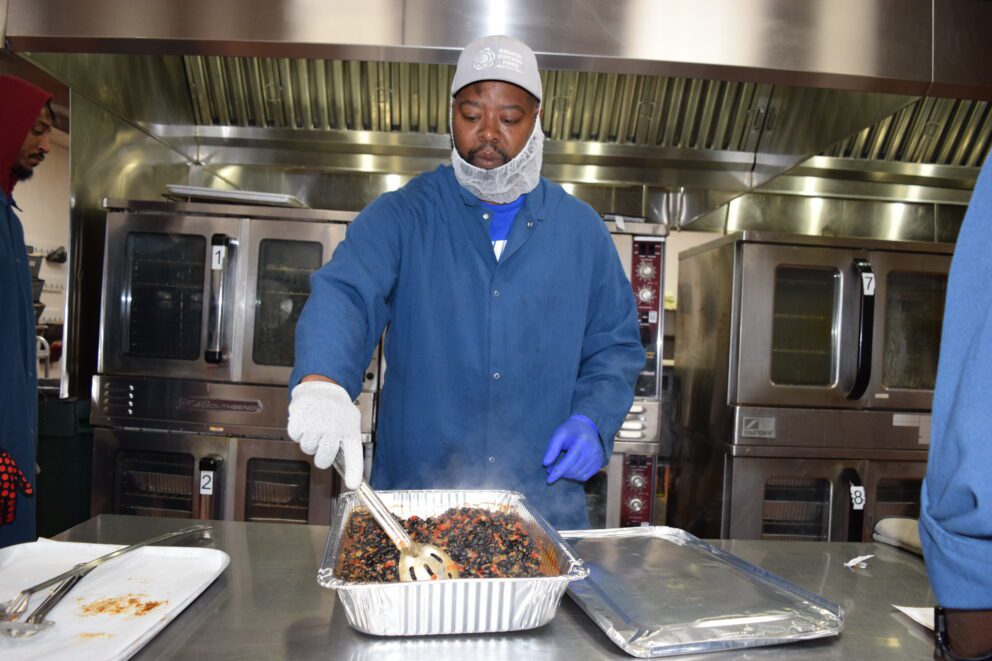
Food production assistant Aruthur Rupert puts the final touches on a meal going to a shelter.
All told, we are currently serving about 2,000 new arrivals weekly. These deliveries are in addition to our existing hunger-relief programs and are possible thanks to the ongoing generosity of Food Depository supporters.
Several of our partners are also serving new arrivals at their food pantries and other meal programs. For those who hadn’t previously served Spanish-speaking guests, Food Depository staff have helped to translate signage into Spanish, and worked with partners to ensure they have the foods familiar to the new pantry guests, such as lentils and chickpeas.
The Food Depository remains committed to working collaboratively with the City, our partners and donors for as long as needed to ensure everyone in our community – longtime neighbor or new arrival – has the nutritious food they need to thrive.
Share This Post

